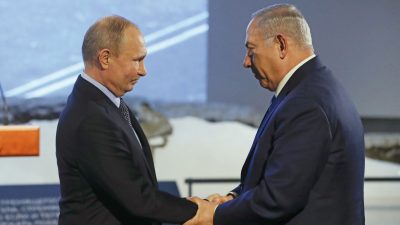The Upcoming Putin-Netanyahu Summit Will Seek to Strike a Balance in Syria

Russian President Vladimir Putin and Israeli Prime Minister Benjamin Netanyahu will see each other during an upcoming summit, which will be their first meeting since last month’s tragedy.
The Israeli premier said that he spoke to President Putin on 7 October, which just so happened to be the Russian leader’s birthday, and announced that they’ll meet face-to-face sometime soon. There’ll surely be a lot for them to talk about when they do, though, since Moscow has already gone through with its promised shipment of S-300s to Syria that Tel Aviv warned earlier this year might prompt it to destroy these defensive anti-air systems if Damascus uses them against its aircraft whenever they engage on bombing missions in the Arab Republic. The Russian Defense Ministry acknowledged that Israel’s previous claim of carrying out over 200 bombings there in the past 18 months alone was true but remarked shortly after last month’s tragedy that they only informed Moscow in advance through the so-called “deconfliction mechanism” created just prior to Russia’s 2015 anti-terrorist intervention in only around 10% of these total attacks.
That will probably change now that the S-300s are in Syria, though that development in and of itself doesn’t exactly mean what many people might think that it does either. The Russian military is still in possession of these systems and training their Syrian counterparts over a three-month period on how to use them, after which it’s almost been left deliberately ambiguous whether they’ll be fully transferred to their host’s control or not. Russian spokespeople have said on numerous occasions that the S-300s are being shipped to Syria strictly to ensure the safety of their troops there, which leaves open the conceivable possibility that a so-called “compromise” might be reached between Russia and Israel to have Moscow retain control over these systems instead of giving Damascus full and independent control over them, which might further an incipient rapprochement between Russia and Israel and prevent the regional situation from becoming more unpredictable.
Israel has made it clear that it will not stop attacking IRGC and Hezbollah positions in Syria that it believes pose a threat to its national security, while Syria will probably defend itself with the S-300s if it does, potentially sparking a larger war despite this being its sovereign right. Understanding this dynamic, reports have recently surfaced that Russia is trying to mediate between Iran and Israel in Syria in order to prevent Tel Aviv from partaking in any more strikes in the first place, which might be why President Putin said earlier this month that Moscow is “pursuing a goal that there would be no foreign forces of third states in Syria at all” after the end of the war. Ideally, Russia will try to facilitate a so-called “gentlemen’s agreement” between the two regional adversaries, which could be part of what President Putin discusses with Netanyahu during their forthcoming summit.
*
Note to readers: please click the share buttons above. Forward this article to your email lists. Crosspost on your blog site, internet forums. etc.
Andrew Korybko is an American Moscow-based political analyst specializing in the relationship between the US strategy in Afro-Eurasia, China’s One Belt One Road global vision of New Silk Road connectivity, and Hybrid Warfare. He is a frequent contributor to Global Research.

